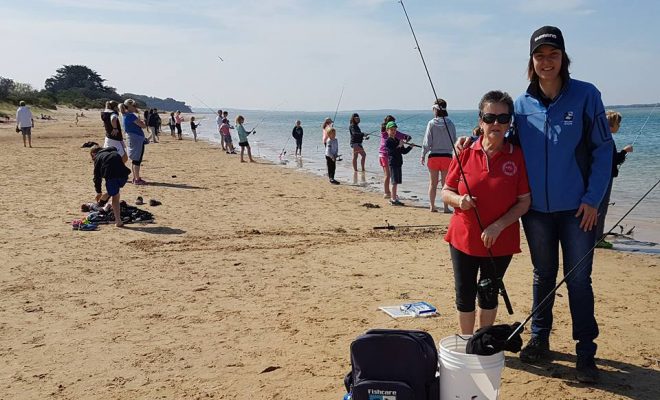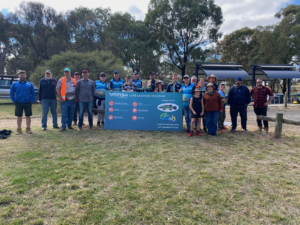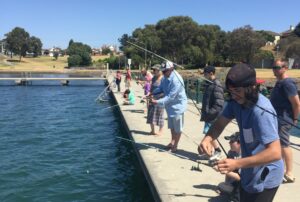November 22, 2018
Victorian recreational fishing is a $2.4 billion industry with over 838,000 recreational fishers across the state. You probably have a fair idea why fishing is so popular and what has led us to the success we experience today. However, our world around us and our communities are rapidly changing that will impact all aspects of fishing both positively and negatively.
Government has an important role to play but we would also argue many of the solutions of tomorrow’s challenges exist within our people in our sector. VRFish believes we need to invest in the development of our people and support them with the skills and tools to help guide our sector forward. We have expertise within our sector that if they were empowered, supported and had the resources they could do even more amazing things and make an even bigger impact for the long-term. Also, non-profit community organisations by nature are more agile, make funds go much further than government, have lower operational costs and can leverage volunteer time contributions from our passionate members in the sector. Funds can also be used to attract corporate sponsors and partners.
As part of our 8-point Election Policy, VRFish is asking for $4 million over 4 years to be invested into the recreational fishing sector to coordinate and deliver:
- Community and school education programs;
- Extension and adoption programs to improve best practice and fish welfare, and;
- Leadership and training initiatives to build capacity within our sector to meet current and future challenges.
Educating the next generation of fishers starts at school, hence why it’s important to support school programs such as Fishcare Victoria. A not-for-profit organisation promoting responsible and sustainable fishing practices to the next generation of fishers, Fishcare Victoria only operate in the South West, Melbourne, Gippsland, Geelong and Ballarat. Fishcare Victoria also aim to increase stewardship of Victoria’s precious aquatic environment to ensure the sustainable future of recreational fishing in Victoria. It would be great to see this quality structured education and curriculum linked program expanded Statewide to deliver more programs to more young Victorians who are our future generation of fishers.
That’s The Thing About Fishing use fishing to support the most vulnerable members of our community, including at risk youth and disabled persons, through fishing clinics and mentoring programs. These clinics are based in the Mornington region and are inclusive of all abilities and backgrounds. Speaking to colleagues at Western Australia’a Fishability Inc. they report many enquires from Victoria looking for such a program here in Victoria and specialised equipment. The Fly Program operates out of NSW and is a targeted program to support men at risk through fly fishing and the outdoors and would be a welcome program here in Victoria. Our conclusion, is there is a clear demand for these types of services across the State to benefit our community and improve social well being through fishing.Non-profit community organisations by nature are more agile, make funds go much further than government, have lower operational costs and can leverage volunteer time contributions from our passionate members in the sector. Funds can also be used to attract corporate sponsors and partners.
Fishing clubs bring people and communities together. While being a focal point for fishing in their local communities they also play a major role in education, promoting fishing and running events Fishers are connecting en mass outside traditional ‘brick and mortar’ using social media. These virtual communities should not be overlooked and equally supported.
Their intimate knowledge about their local fishery and their role in advocacy is extremely valuable. Clubs and their members have enacted positive change on many levels from runnning . For example, the living shellfish reef restoration project in Port Phillip Bay was born and championed within the Albert Park Yachting and Angling Club. Development programs that may be afforded to other sports are needed to support administration of the club, adherence with policies and codes, grow the club by attracting new members and to innovate. Clubs can be a vehicle to support more juniors, women and culturally diverse communities in conjunction with other strategies.
The Victorian Fisheries Authority established a Women in Fishing Network in 2018. With greater engagement and discussion will no doubt yield the need for new strategies and programs to empower more women into fishing and into leadership roles within our sector. Fishers trust other fishers so much so that other fishers are quoted as the main source of fishing information. Therefore, there are opportunities for fishers take the lead in the ongoing development and promotion of best practice programs and campaigns such as catch and release, safety and environmental stewardship. VRFish has in the past run campaigns such a Released Snapper Survival and a Steer Clear in the Rip program. However, there are more programs needed and some of these need to be ongoing.
In terms of supporting our fishers participating in research and on-ground works, there are 838,000 potential citizen scientists across Victoria that could be mobilised to help monitor and track our fisheries and evaluate the success of Victoria’s stocking program, habitat improvement projects as well as other programs. Fishers are also participating and leading fish habitat restoration at an increasing rate. To create and support an army of fishers to improve our waterways does not happen without chance, it requires building the capacity of our fishers in organisations such as the Australian Trout Foundation, Native Fish Australia and OzFish Unlimited.
Investing in leadership and training programs helps to develop passionate future leaders that reflect the diversity of our sector and build capacity of our advocates – remembering many of our advocates are volunteers. A leadership programs has the ability to encourage networking amongst likeminded recreational fishers, the development of mentor-mentee relationships with experienced fishing leaders and provide support to participants in their future aspirations within the sector.
The article is not intended to be a comprehensive analysis but highlights the outstanding work to date and a huge untapped potential that exists in or sector. So while we push for more fish and better fishing we also need to consider our people. Currently, our sector isn’t funded nearly enough to empower more recreational fishers and develop our sector for the future.








